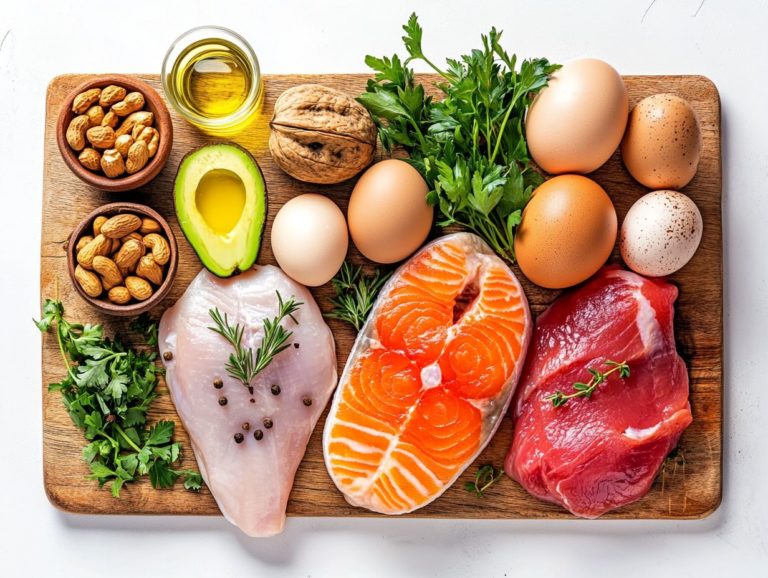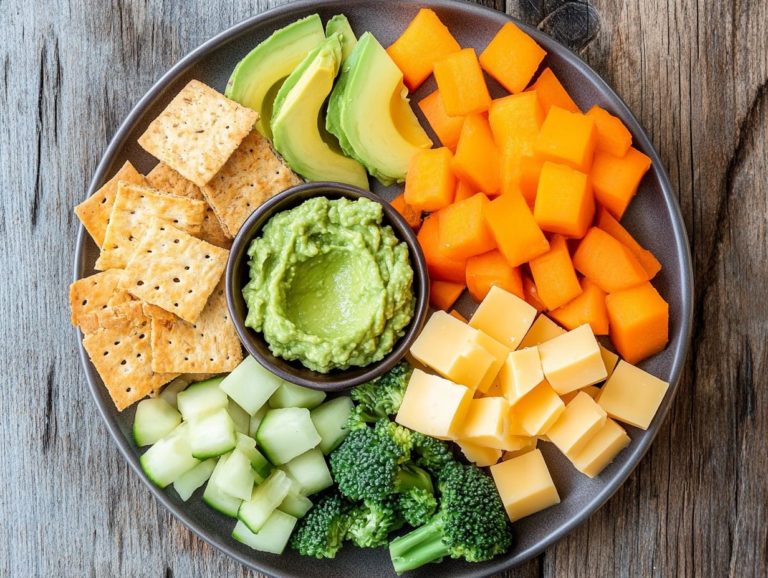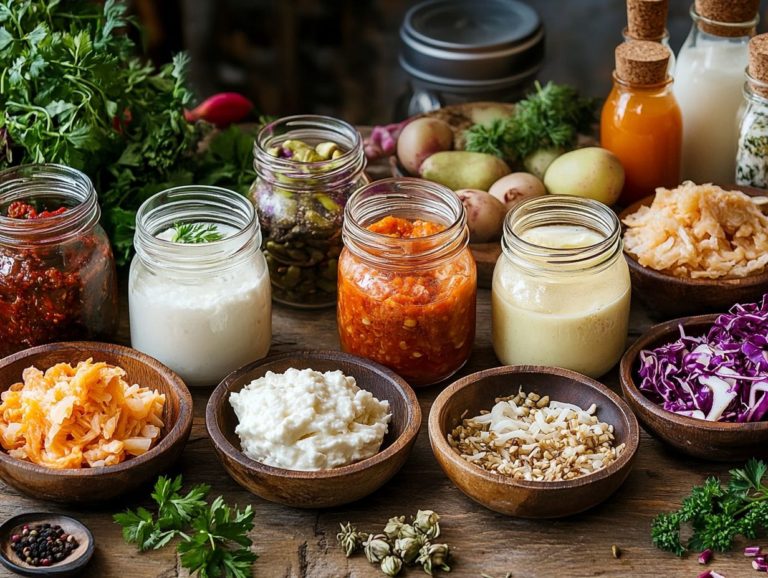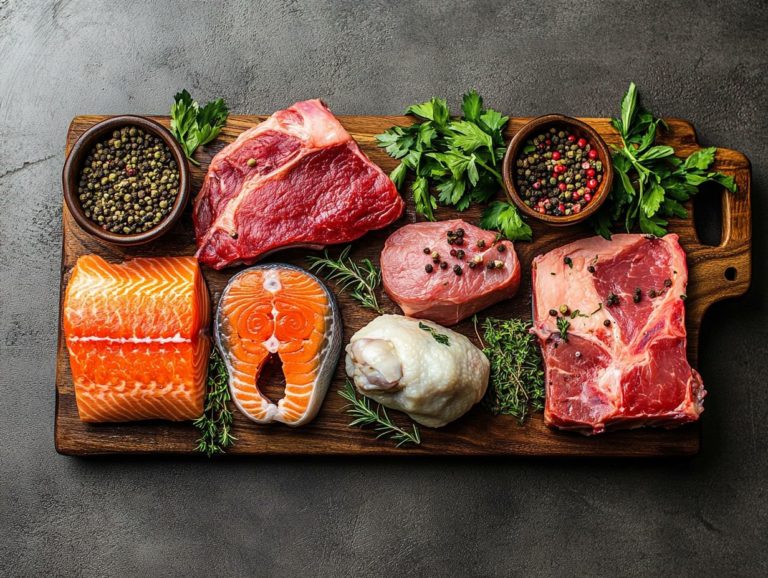Understanding the Role of Eggs in Keto
The keto diet has surged in popularity, celebrated for its potential weight loss benefits and its focus on low-carb, high-fat foods. Notable advocates, such as Tim Tebow, have highlighted its effectiveness in promoting metabolic health and overall well-being.
Among the essential components of this diet, eggs truly shine as a nutritional powerhouse. Their rich content of essential nutrients, including amino acids, vitamins, and minerals, makes them indispensable in this dietary plan.
This article delves into the fundamentals of the keto diet, emphasizing its benefits, permissible foods, and the crucial role that eggs play in this lifestyle. Discover how eggs can supercharge your journey to better health today!
Whether you re a seasoned keto enthusiast or just embarking on this journey, you ll uncover the nutritional advantages of eggs, their relationship with cholesterol, and gain insightful tips on seamlessly incorporating them into your keto meal plan, including easy recipes like egg-based meals and meal prep tips.
Contents
Key Takeaways:

- Eggs are a nutrient-dense food that is allowed on the keto diet, providing essential vitamins, minerals, and protein to support overall health and weight loss goals.
- Despite containing cholesterol, eggs do not negatively impact cholesterol levels and can even improve the ratio of good to bad cholesterol when consumed as part of a well-rounded keto diet. Their nutrient-dense profile makes them an ideal protein source in this diet plan.
- Incorporating eggs into your keto meals is easy and versatile, with plenty of delicious recipes available and no limit on the number of eggs you can consume as long as they fit into your daily macros.
The Basics of the Keto Diet
The ketogenic diet, often known as keto, is a low-carb, high-fat eating plan that has captured attention for its remarkable health benefits, such as weight loss, enhanced energy levels, and improved mental clarity.
By drastically cutting back on carbohydrates and substituting them with nutritious fats, your body enters a state where it burns fat for energy instead of relying on carbs. This process also helps manage blood sugar levels and reduce insulin resistance.
This guide will delve into the essential elements of the keto diet, covering its definition, advantages, and acceptable foods. Understanding the macronutrient breakdown of your meals can significantly enhance your success on this journey.
What is the Keto Diet?
The keto diet, also known as the ketogenic diet, is a dietary approach that significantly reduces your carbohydrate intake while substantially increasing your healthy fat consumption, all in an effort to induce a state of ketosis in your body.
In contrast to traditional dietary guidelines that often promote a balanced intake of carbohydrates, proteins, and fats, the keto diet places a premium on low-carb foods, limiting carbohydrate consumption to around 5-10% of your total daily calories. This deliberate shift encourages your body to burn fat for energy rather than glucose, which can lead to a host of health benefits including enhanced mental clarity, improved blood sugar control, and the potential for weight loss.
As you embark on this lifestyle, understanding your dietary needs is essential. It gives you the power to make informed choices about the foods you consume, aligning them with your health goals and ultimately supporting a sustainable path toward improved well-being.
What Are the Benefits of the Keto Diet?
The keto diet presents a wealth of health benefits, largely due to its remarkable ability to promote weight loss, enhance mental clarity, and elevate energy levels by shifting your body s metabolic process toward fat burning through ketosis.
This low-carbohydrate, high-fat dietary approach not only assists you in shedding those stubborn pounds but also plays a vital role in stabilizing blood sugar levels, which is particularly advantageous for individuals dealing with insulin sensitivity or type 2 diabetes.
As your body becomes more adept at utilizing fat for fuel, you may find that cravings and appetite diminish, making it easier to stick to your nutritional goals. Many who embrace this lifestyle report a boost in cognitive function and mental acuity, likely because of the steady energy supply from ketones that supports overall brain health.
These benefits create a comprehensive strategy for enhancing your well-being, making the keto diet an enticing option for countless individuals.
What Foods Are Allowed on the Keto Diet?
On the keto diet, you re primarily embracing:
- Low-carb vegetables
- Healthy fats
- High-quality protein sources like eggs, avocados, and select meats
Including eggs in your meal plan supports your intake of essential amino acids and other key nutrients. You can elevate your dishes with a variety of greens such as spinach, kale, and broccoli, all while keeping your carbohydrate intake in check.
It s essential to incorporate healthy fats from sources like olive oil, nuts, and coconut oil to maintain your energy levels and promote that satisfying feeling of fullness. Protein sources such as poultry, fish, and cheese play a vital role as well, providing essential nutrients and supporting muscle maintenance.
By grasping the macronutrient breakdown of each food category, you can create balanced plates that not only quell your hunger but also align with your dietary goals, proving that the keto diet can be both sustainable and enjoyable.
What Are Eggs?
Eggs are not just versatile; they are a powerhouse of nutrients! They stand out as a remarkably versatile and nutrient-dense food, celebrated for their impressive nutritional value. Packed with essential amino acids, vitamins, and minerals, they serve as an excellent source of protein, perfectly aligning with a range of dietary plans, including the ketogenic diet.
What Are the Nutritional Benefits of Eggs?

Eggs present a remarkable array of nutritional benefits, delivering high-quality protein along with essential vitamins and minerals that are vital for maintaining optimal health, as affirmed by health experts and dietary guidelines.
These small yet versatile food items are abundant in key vitamins such as B12, which is crucial for nerve function and the formation of red blood cells, and vitamin D, essential for calcium absorption and bone health.
Eggs also pack important minerals like selenium, an antioxidant that protects your body against oxidative stress, and choline, essential for brain health and cell membrane integrity.
By integrating eggs into your balanced diet, you can significantly boost your intake of these nutrients, thereby fostering overall wellness and fortifying your immune system.
How Are Eggs Used in the Keto Diet?
In the ketogenic diet, eggs become a cornerstone of your culinary repertoire, thanks to their rich protein content and remarkable versatility. This makes it effortless for you to whip up a variety of keto-friendly recipes that fit seamlessly into your low-carb meal prep.
Consider the simple pleasure of scrambled eggs, ready in mere minutes, or the refined touch of poached eggs that elevate any dish. The choices are abundant: hard-boiled eggs offer a convenient snack or a perfect salad topping, effortlessly meeting your protein needs throughout the day.
Each cooking method not only enhances the flavor but also invites your creativity into meal prep, making eggs an essential staple for anyone embracing a keto lifestyle. Whichever technique you choose, you preserve their nutritional value while easily incorporating them into diverse recipes, ensuring that your meals remain delightful and low in carbs.
Don t miss out on incorporating these nutrient-packed eggs into your meals!
Eggs and Cholesterol
Cholesterol has always sparked debate in the realm of nutrition, especially when it comes to eggs. While eggs are recognized for their high cholesterol content, they also offer a wealth of essential vitamins and minerals that can enhance your overall health. This is particularly true when eggs are integrated into a balanced diet.
What is Cholesterol?
Cholesterol is a waxy substance present in every cell of your body. It plays a vital role in producing hormones, vitamin D, and the necessary substances for digestion. However, it’s essential to monitor your cholesterol levels for overall health.
You should pay attention to two main types of cholesterol: low-density lipoprotein (LDL), commonly known as “bad” cholesterol, and high-density lipoprotein (HDL), often referred to as “good” cholesterol.
While LDL can contribute to the buildup of fatty deposits in your arteries, increasing your risk of heart disease, HDL works to transport cholesterol away from your arteries and back to the liver for removal from your body.
Understanding the balance between these cholesterol types is crucial for maintaining optimal health. Managing your intake according to dietary guidelines can improve your cardiovascular health. By incorporating foods rich in healthy fats, minerals, and other beneficial nutrients, you can promote healthy cholesterol levels and support your overall wellness.
What is the Relationship Between Eggs and Cholesterol?
The relationship between eggs and cholesterol has sparked considerable research and debate. It is likely that moderate egg consumption won t have a significant impact on your cholesterol levels. It may also offer health benefits.
Recent dietary guidelines suggest that for most individuals, indulging in a few eggs each week can seamlessly fit into a healthy diet. This viewpoint aligns with the latest findings, which highlight eggs as not just a versatile food option but also a powerhouse of essential nutrients, including protein, vitamins, and minerals.
Eggs are rich in beneficial compounds that may support your overall health. They make a worthy addition to your meals when enjoyed in moderation.
It s essential to focus on your entire dietary pattern instead of fixating on individual food items. Adopting a balanced approach can help you optimize your nutrition while minimizing health risks.
How Does the Keto Diet Affect Cholesterol Levels?
The ketogenic diet can influence cholesterol levels in several ways. Often, it results in increased HDL (the good cholesterol) while potentially raising LDL (the bad cholesterol). This highlights the importance of monitoring your individual responses closely.
As you transition into ketosis a metabolic state marked by elevated ketone bodies and a reduced reliance on glucose you may notice fluctuations in your cholesterol levels. These fluctuations can bring both health benefits and concerns.
The rise in HDL is typically a positive sign, as it aids in clearing LDL from your bloodstream. However, the simultaneous increase in LDL can be a cause for concern regarding heart health. Therefore, stay alert and observe how your body reacts to this high-fat intake.
Evaluating your overall fat levels alongside lifestyle factors such as diet quality and physical activity is essential for gaining a comprehensive understanding of the cardiovascular risk associated with the keto diet.
Eggs and Weight Loss on Keto

Incorporating eggs into your ketogenic meal plan can be incredibly beneficial for weight loss. Their high protein content, versatility, and ability to keep you feeling full make them an ideal addition to your keto diet.
So why not include eggs in your meal today and enjoy their amazing benefits?
How Do Eggs Help with Weight Loss on Keto?
Eggs play a crucial role in supporting your weight loss journey on the keto diet, primarily due to their protein-rich composition. This promotes a sense of fullness and helps reduce overall caloric intake, making them an essential element in your effective meal prep strategy.
The science of fullness indicates that protein-rich foods like eggs take longer to digest, providing sustained energy and prolonging periods of reduced hunger. This is particularly advantageous for anyone following a ketogenic lifestyle, where a low carbohydrate intake can sometimes create feelings of deprivation.
By integrating eggs into a variety of meals whether you opt for classic scrambled eggs or indulge in healthier frittatas you can effortlessly enhance your protein intake while staying aligned with your macro goals.
Consider meal prepping on weekends by hard-boiling eggs, ensuring you have quick snacks or breakfasts ready for the week. This approach maximizes convenience without compromising nutritional value.
What Are the Other Benefits of Eggs on Keto?
Along with facilitating weight loss, eggs provide a wealth of health benefits on the keto diet, delivering essential nutrients, vitamins, and minerals that bolster your overall well-being.
Rich in high-quality protein, eggs play a pivotal role in muscle repair and growth, making them an exceptional choice for anyone engaged in regular exercise. They are also an outstanding source of vitamin D, crucial for maintaining bone health and supporting immune function.
With essential fatty acids and powerful antioxidants like lutein and zeaxanthin, eggs contribute to eye health and may lower the risk of age-related macular degeneration.
By incorporating eggs into your diet, you can effectively combat a lack of nutrients, ensuring a balanced intake of vital components for optimal health.
How to Incorporate Eggs into Your Keto Diet
Get ready to enjoy eggs in countless delicious ways on your keto journey! You can effortlessly incorporate eggs into your ketogenic diet through a variety of cooking methods and simple recipes. They become a fundamental food group that offers endless possibilities for your meal prep ideas.
What Are Some Easy Keto Egg Recipes?
Easy keto egg recipes encompass a delightful range, from scrambled eggs to egg muffins, offering you delicious and satisfying options that perfectly align with a low-carb diet while streamlining your meal prep.
These recipes showcase the remarkable versatility of eggs, positioning them as an ideal choice for anyone eager to relish hearty meals without compromising their dietary goals. Take, for instance, egg frittatas, which can easily be customized with a variety of vegetables and meats to suit your unique taste preferences all while being quick and effortless to make.
Baked egg dishes and deviled eggs make for excellent snack ideas or appetizers, adding a touch of excitement and nourishment to your meal plan. By embracing these accessible recipes, you not only simplify your cooking endeavors but also ensure that maintaining a keto lifestyle becomes a pleasurable and fulfilling experience.
How Many Eggs Should You Eat on Keto?
The ideal number of eggs to include in your keto diet can vary based on your individual dietary needs. Aim for a few eggs each day for great nutritional benefits without exceeding your calorie goals.
You likely have unique health goals that directly influence your meal plans, which can affect how many eggs you choose to consume. If your aim is muscle gain, you might find yourself reaching for more eggs to boost your protein intake. On the other hand, if weight loss is your primary focus, you may opt to keep your egg consumption lower to maintain a caloric deficit.
Your activity level is also a significant factor. If you’re regularly engaging in physical activities, you may require additional protein to support recovery and performance, leading you to increase your egg intake.
Ultimately, your personal preferences and lifestyle choices will determine how eggs fit into the larger picture of your well-rounded keto diet.
What Are Some Tips for Buying and Storing Eggs on Keto?

When you re embarking on your keto journey, choosing and storing eggs wisely can significantly elevate their freshness. This will streamline your meal prep process.
Start by seeking out eggs labeled as organic or free-range; these designations typically signal healthier, nutrient-rich options. As you shop, don t forget to check the pack date. Aim to use your eggs within three to five weeks for peak freshness. To further ensure their quality, try a simple freshness test at home: place the egg in a bowl of water. Fresh eggs will sink, while older ones will float.
For optimal storage, keep the eggs in their original carton and position them in the coldest part of your refrigerator, avoiding the door. This helps maintain a consistent temperature and safeguards their quality.
By following these easy tips, you ll find that your meal prep not only becomes more enjoyable but also significantly more nutritious.
Frequently Asked Questions
Here are some common questions about eggs on a keto diet:
What is the role of eggs in a keto diet?
Eggs are a staple food in the keto diet due to their high fat and protein content. They provide satiety, promote fat burning, and help regulate blood sugar levels.
How many eggs should I eat on a keto diet?
The recommended daily intake of eggs on a keto diet is 1-2 whole eggs per day. This ensures that you are not consuming too much cholesterol while getting a balanced amount of nutrients.
Can I eat only eggs on a keto diet?
While eggs are a great source of nutrients on a keto diet, it is not recommended to eat only eggs. It is important to have a well-rounded diet that includes a variety of foods to ensure you are getting all the necessary nutrients.
Are egg yolks allowed on a keto diet?
Yes, egg yolks are allowed on a keto diet as they are a great source of healthy fats. They also contain important nutrients like choline, which is essential for liver function and brain health.
Can I eat eggs for every meal on a keto diet?
Eating eggs for every meal on a keto diet is not recommended. While they are a great source of nutrients, it is important to have a diverse diet that includes other healthy fats, proteins, and vegetables.
What are some creative ways to incorporate eggs into a keto diet?
There are many creative ways to incorporate eggs into a keto diet. Some ideas include making omelets, frittatas, and egg cups for breakfast. You can also use eggs as a binding agent in keto-friendly baked goods or make egg-based casseroles and quiches for lunch or dinner.






